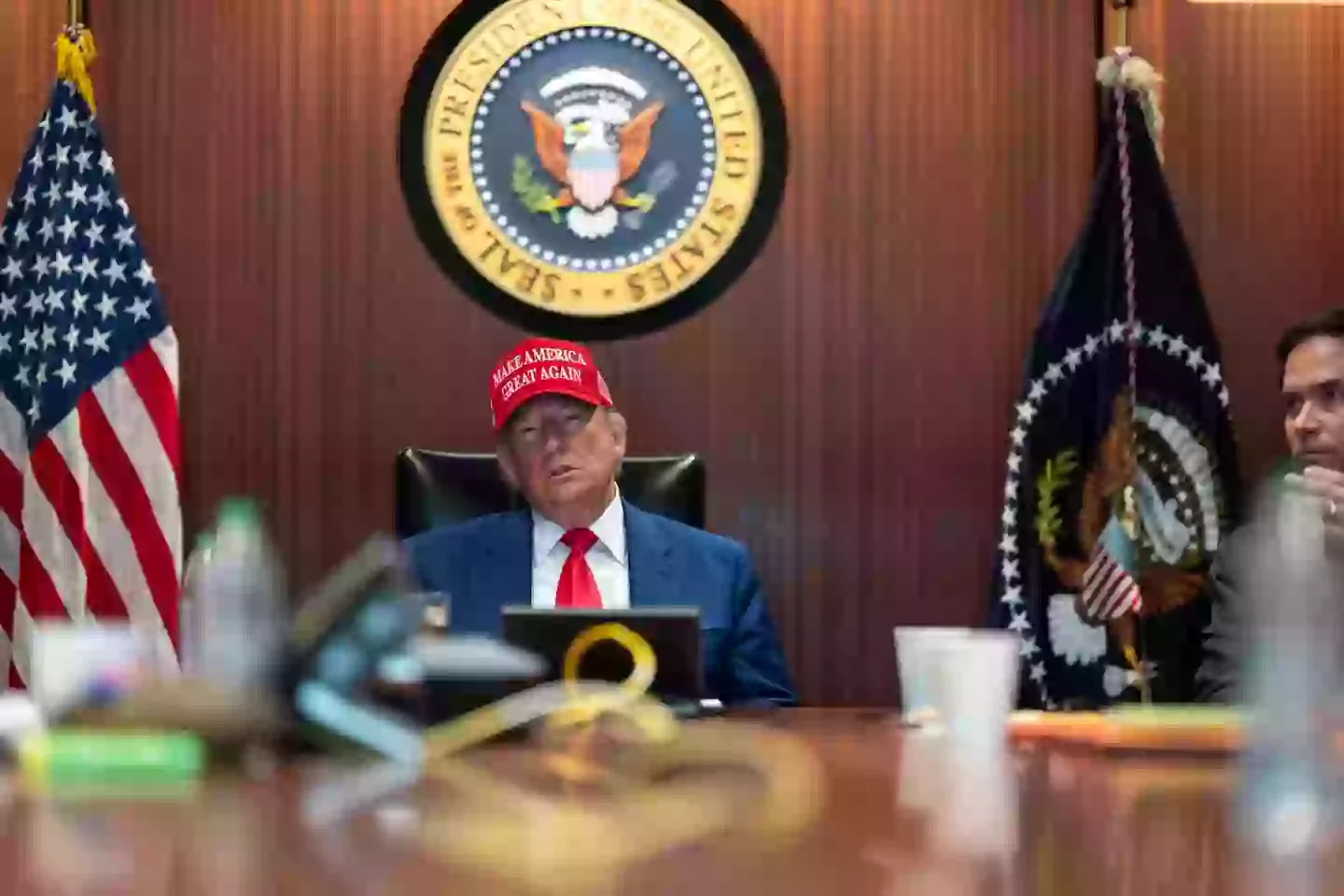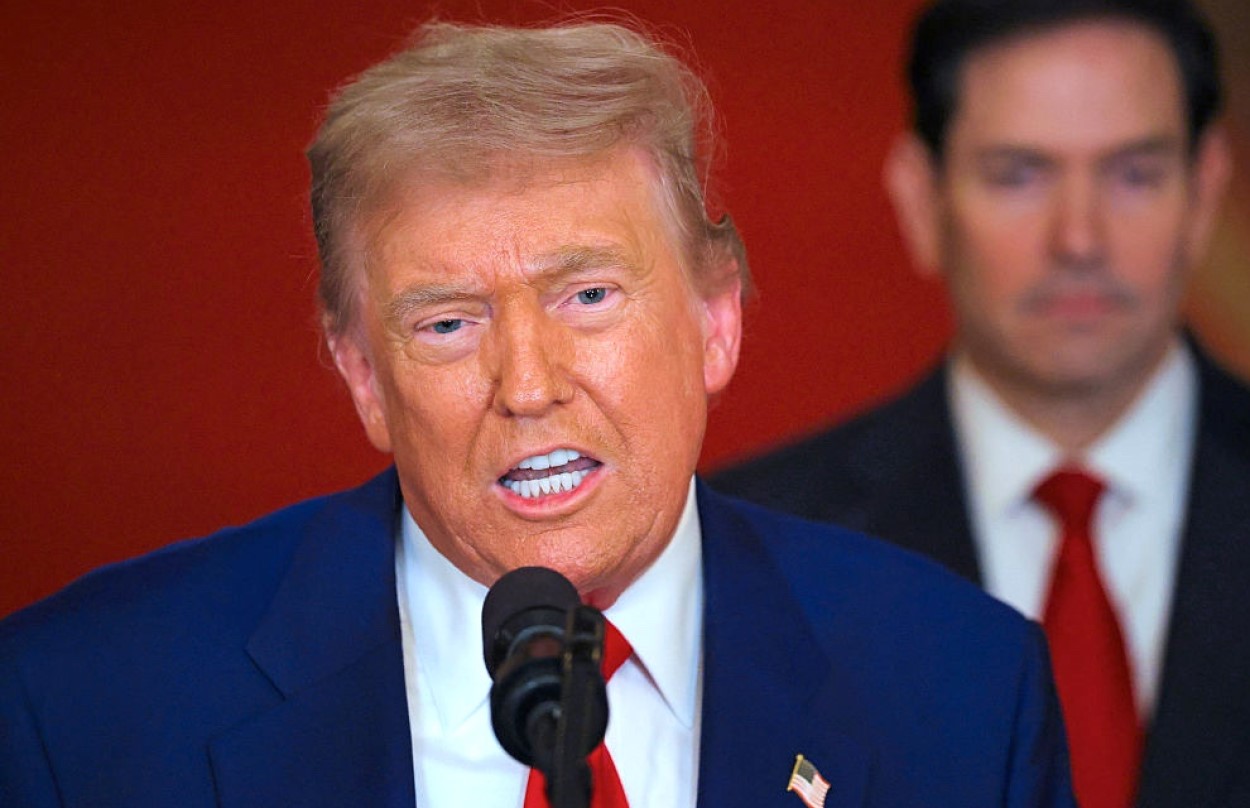A Fragile Peace in the Balance
In a time of global uncertainty and regional unrest, statements from world leaders carry immense weight. As the Middle East teeters on the brink of renewed conflict, a prominent message has emerged that signals the high stakes and delicate nature of diplomatic efforts underway. What appeared to be the beginning of peace quickly became clouded by renewed accusations and heightened military alertness, leaving the global community watching anxiously.
Amid swirling reports, escalating rhetoric, and alleged violations, former President Donald Trump made headlines once again—this time, with a bold and urgent warning directed not at Iran, but at Israel. This unexpected pivot has sparked widespread analysis, reflection, and political debate, placing renewed scrutiny on the evolving dynamic between three powerful actors in the Middle East: Israel, Iran, and the United States.

(Daniel Torok/The White House via Getty Images)
Trump Declares Peace — Then a Shift
Donald Trump had initially taken to his social media platform, Truth Social, to deliver what many assumed was a hopeful and potentially stabilizing update. According to Trump, both Iran and Israel had expressed willingness to de-escalate their aggressive military actions. Referring to the recent bout of violence as “THE 12 DAY WAR,” Trump lauded the leaders of both countries for what he described as “Stamina, Courage, and Intelligence” to choose peace over prolonged bloodshed.
He wrote:
“Israel & Iran came to me, almost simultaneously, and said, ‘PEACE!’ I knew the time was NOW. The World, and the Middle East, are the real WINNERS! Both Nations will see tremendous LOVE, PEACE, AND PROSPERITY in their futures.”
Trump’s rhetoric leaned heavily on the possibility of transformation. He envisioned a future where historical adversaries could pave a new path — one grounded not in mutual suspicion or retribution, but in cooperation, progress, and spiritual awakening.
“They have so much to gain, and yet, so much to lose if they stray from the road of RIGHTEOUSNESS & TRUTH. The future for Israel & Iran is UNLIMITED, & filled with great PROMISE. GOD BLESS YOU BOTH!”
It was, by all appearances, a declaration of a pivotal moment.
Allegations Break the Calm
However, the calm did not last.
Just hours after the former president’s announcement, conflicting reports emerged suggesting that Iran had fired missiles at Israeli territory — an action that, if confirmed, would constitute a direct breach of the ceasefire.
Iranian state-run media promptly denied the allegations, claiming that no such missile strike had occurred after the ceasefire was put in place. Their messaging painted the accusations as provocations or misunderstandings. Yet, Israeli intelligence reportedly claimed that two missiles had indeed been launched and intercepted.
The news set off a cascade of reactions.
Israel’s Posture and Political Response
Israeli Prime Minister Benjamin Netanyahu was quick to respond, making it clear that Israel’s commitment to defense was unwavering.
“Israel will respond forcefully to any violation of the ceasefire,” Netanyahu declared, leaving little room for ambiguity.
Defense Minister Israel Katz echoed this hardline stance, emphasizing that any breach by Iran would not go unanswered.
“I have ordered the Israel Defense Forces to respond forcefully to Iran’s violation of the ceasefire with intense strikes against regime targets in the heart of Tehran,” Katz reportedly said.
Though the missiles were intercepted, the strategic and symbolic implications were significant. Israel’s readiness to retaliate underscored the fragility of the ceasefire and heightened the possibility of a broader military escalation.
Trump’s Unexpected Warning
In a move that stunned many, Trump once again turned to Truth Social — but this time with a markedly different tone. Rather than reinforcing Israel’s right to retaliate, he issued a cautionary directive aimed squarely at America’s historic ally.
“ISRAEL. DO NOT DROP THOSE BOMBS. IF YOU DO IT IS A MAJOR VIOLATION. BRING YOUR PILOTS HOME, NOW! DONALD J. TRUMP, PRESIDENT OF THE UNITED STATES.”
This warning, both blunt and emphatic, was met with surprise and mixed reactions across the political spectrum. It suggested that Trump viewed a potential retaliatory strike as a trigger point — one that could unravel the ceasefire and spiral the region back into uncontrollable chaos.
For some, the warning signaled statesmanship and restraint; for others, it was seen as interference in a nation’s sovereign right to defend itself. Either way, the message was clear: Trump was trying to hold the line on de-escalation, even if it meant publicly pressuring Israel.
The Complexity of US-Israel Relations
The United States and Israel have long enjoyed a close alliance, underpinned by shared democratic values, strategic cooperation, and extensive military support. Trump’s presidency saw a deepening of that bond, marked most notably by the relocation of the U.S. embassy to Jerusalem in 2018 and robust support for Israel in global diplomatic arenas.
That’s what makes this public admonition even more striking.
By directly telling Israel to stand down, Trump inserted himself once again into the delicate balance of diplomacy and defense in the Middle East. The move raised eyebrows within the U.S. foreign policy establishment and prompted questions about how such directives would be received by the Israeli military and political leadership.
A Region on the Brink
The tensions between Iran and Israel are not new. From cyberattacks to proxy conflicts and covert operations, the two nations have engaged in a prolonged shadow war for decades. The most recent flare-up — culminating in what Trump dubbed the “12 Day War” — brought the simmering hostility into a full boil.
Thousands of lives have been affected, and global markets have watched anxiously as oil prices, military alliances, and regional stability all hang in the balance. For many international observers, the biggest concern remains the unpredictability of the current situation.
With Iran denying ceasefire violations and Israel preparing for countermeasures, the potential for misinformation or miscalculation remains dangerously high.
Peace or Pause?
Trump’s insistence that peace was agreed and his later warnings suggest a personal stake in preventing further violence. He positioned himself as a key intermediary — someone who, in his view, helped facilitate the ceasefire and now feels responsible for ensuring its survival.
His vision of a prosperous, peaceful Middle East — while idealistic — is not without significant hurdles. Historical grievances, religious divides, political ambition, and strategic defense all compete for dominance in this complex landscape.
Still, the former president’s actions highlight an important question: Can diplomacy be maintained in the absence of trust?
International Reaction and Public Sentiment
Global leaders have responded to the evolving crisis with calls for restraint. The United Nations Secretary-General issued a statement urging all parties to avoid escalation and prioritize diplomatic dialogue. European Union officials have also expressed concern about the fragility of the ceasefire and warned of “grave consequences” if hostilities resume.
Public reaction has been mixed. In Israel, some see Trump’s message as a betrayal, while others acknowledge the importance of avoiding a larger conflict. In Iran, the ceasefire is viewed by some as a tactical move, while hardliners continue to push for resistance against what they see as Western imperialism.
What Comes Next?
The days ahead are critical. Intelligence-sharing, military readiness, and diplomatic efforts will all play a role in shaping the next phase of this conflict. Whether Trump’s public warning to Israel proves to be a wise act of diplomacy or a misguided overreach remains to be seen.
What is certain is that the ceasefire — if it still holds — represents not an end, but a pause. A moment to reflect. A moment to choose the future.
And in that narrow window of stillness, global leadership will be tested, narratives will be shaped, and the course of history may again be altered.

